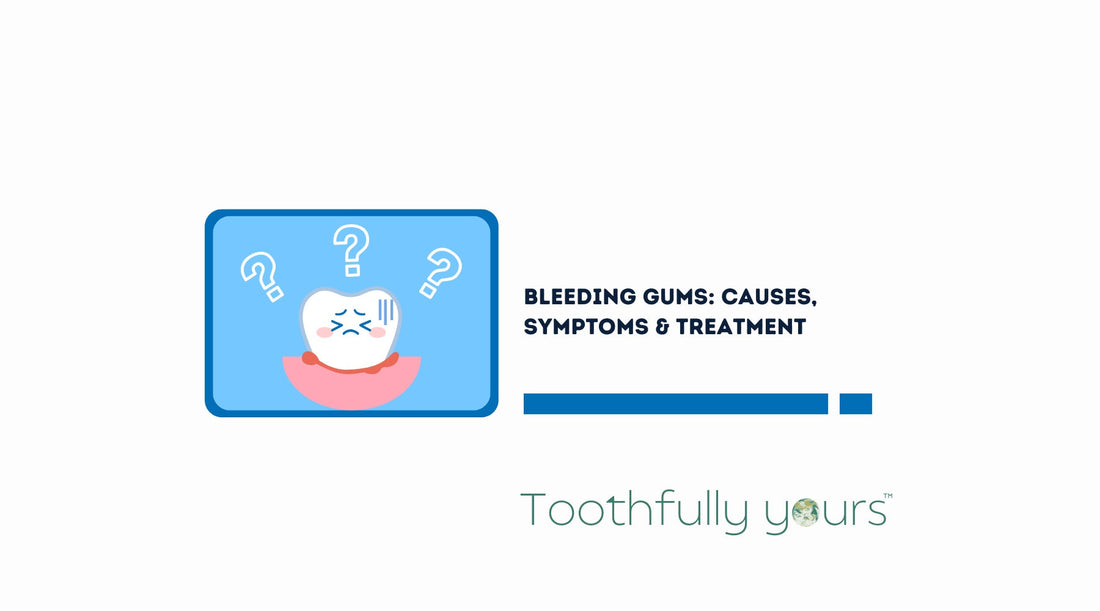
Bleeding Gums: Causes, Symptoms & Treatment
Bleeding gums are a common dental concern that is observed with many people, which can be alarming when first noticed. While occasional gum bleeding may not signify a serious issue, persistent or frequent occurrences could point to underlying health problems. Many people neglect the initial sign of gum bleeding and do not address the issue in the nascent stage, and slowly it grows into a serious problem hampering daily routine and life of a person.
This article explores the causes, symptoms, treatments, and preventive measures for bleeding gums to help you maintain optimal oral health.
What Are Bleeding Gums?
Bleeding gums occur when blood appears around the gumline, often noticed during brushing, flossing, or eating. This is usually a sign of gum inflammation or irritation, commonly known as gingivitis.
Bleeding gums can occur due to many factors, like, wounded gums, infected gums with food debris and other issues related to poor oral hygiene.
If left untreated, it can progress to severe gum disease like periodontitis, which may lead to tooth loss. Identifying the causes and taking preventive measures are essential for maintaining healthy gums and overall oral health.
Causes of Bleeding Gums: Why Are My Gums Bleeding?
There are several reasons why gums may bleed, including:
- Poor Oral Hygiene: Plaque buildup irritates the gums, leading to inflammation and bleeding.
- Gum Disease: Gingivitis (early-stage) and periodontitis (advanced-stage) are common culprits.
- Vitamin Deficiency: Lack of vitamin C or K weakens gums and increases bleeding risk.
- Improper Brushing or Flossing: Hard-bristled brushes or rough flossing can damage gum tissue.
- Hormonal Changes: Pregnancy and hormonal fluctuations make gums more sensitive.
- Medications: Blood thinners can heighten gum bleeding.
- Underlying Conditions: Health issues like diabetes can also affect gum health.
Signs and Symptoms of Bleeding Gums
Bleeding gums may also show other symptoms, such as:
- Red, swollen, or tender gums
- Bad breath (halitosis)
- Receding gums
- Loose teeth
- Pain while chewing
- Blood appearing on the toothbrush or floss
Treatment of Bleeding Gums: How Do Dentists Help?
Dentists provide targeted treatments based on the cause:
- Natural, toxin free toothpaste or toothpaste tabs - Choose products with Neem, Babool, Mango leaf for healthy gums.
- Gum Massages - Gently massaging bags helps keep gum healthy
- Using Interdental brush - Using interdental brush helps clean small debris stuck in gum linings
- Professional Cleaning: Removes plaque and tartar buildup.
- Scaling and Root Planing: Deep cleaning for advanced gum disease.
- Antibacterial Mouthwash: Reduces inflammation.
- Antibiotics: For severe infections.
- Surgical Procedures: For advanced cases, such as gum grafting.
How to Prevent Bleeding Gums
You can keep gums healthy by following these steps:
- Brush gently twice daily with a soft-bristled toothbrush.
- Use highly effective Ayurvedic ingredients to better take care of your oral hygiene.
- Floss daily and use an interdental brush to clean between teeth.
- Use antimicrobial mouthwash to kill bacteria.
- Eat foods rich in vitamin C and K.
- Avoid smoking or tobacco use.
- Visit your dentist regularly for checkups.
Which Vitamin Deficiency Causes Gum Bleeding?
- Vitamin C: Helps maintain gum tissue and prevent inflammation.
-
Vitamin K: Supports proper blood clotting to prevent excessive bleeding.
Incorporating foods like citrus fruits, leafy greens, and fortified products can help address deficiencies.
When to See a Dentist
If gum bleeding persists or is paired with pain, swelling, or loose teeth, see a dentist promptly. Early treatment can prevent serious oral health problems.
FAQs About Bleeding Gums
Q1. Is bleeding gums always a sign of gum disease?
No, it can also be caused by vitamin deficiencies, hormonal changes, or rough oral care habits.
Q2. Can stress cause bleeding gums?
Yes, stress can weaken immunity, increasing the risk of gum inflammation.
Q3. How long does it take to treat bleeding gums?
Mild cases can heal in a few weeks with proper care, while severe cases may require longer treatment.
Q4. Are bleeding gums reversible?
Yes, gingivitis can be reversed with consistent oral hygiene and professional treatment.
Q5. What toothpaste is best for bleeding gums?
Look for herbal or fluoride-free toothpaste with ingredients like neem or babool for gentle care.
Conclusion
Bleeding gums are often an early warning sign of gum issues. By addressing the root causes and practicing good oral hygiene, you can prevent further complications. Regular dental visits and a balanced diet are key to keeping your gums healthy and your smile confident.
Take control of your gum health today! Explore our natural oral care products, including fluoride-free toothpaste tabs and copper tongue cleaners, for effective and gentle care.





